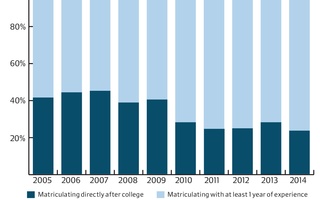Colleges should dramatically alter their admissions practices with a new focus on promoting service, reducing academic and extracurricular stresses, and increasing student diversity, argued writers of a report released Wednesday by Graduate School of Education researchers.
Richard Weissbourd, a long-time GSE lecturer within the school’s “Making Caring Common” project, a research group focused on child development, was the primary author of the report, titled “Turning the Tide.” The report received endorsements from more than 80 administrators across dozens of universities, including professors and administrators at Harvard.
“Turning the Tide’s emphasis on the common good resonates strongly with the mission of Harvard College,” Dean of Admissions and Financial Aid William R. Fitzsimmons ’67, who endorsed the report, wrote in a statement.
The 32-page finalized report, planning for which began in 2014, makes a number of recommendations that, if adopted by individual colleges and universities, could have resounding effects on higher education admissions practices. The report’s authors call on admissions officers to emphasize that they expect successful students to perform community service in high school and focus on the quality, rather than number, of extracurricular activities. {shortcode-a06ef0014ec06dde3d3f0b034c183519cf376fbd}
“Turning the Tide is the first step in a two-year campaign that seeks to substantially reshape the existing college admissions process,” the report’s authors wrote in a press release.
The report recommends that universities take concrete steps to reduce the pressure placed on high school applicants. It specifically suggests admissions offices discourage students from overloading with too many extracurricular activities and Advanced Placement classes. The report also recommends that colleges work to relieve the pressure associated with standardized testing, such as by “discouraging students from taking an admissions test more than twice.”
Since its conception, the report drew on the endorsements and research of dozens of administrators and admissions officers. At an initial meeting in 2014, “administrators and scholars from all over the country met to discuss the possibility of creating such a report and securing support for it,” Howard E. Gardner ’65, a professor of education at the Ed School, wrote in an email.
“The birthing process was lengthy,” Gardner added, writing that it “involved multiple iterations, feedback, and suggested changes, on the part of a score of persons.”
Gardner also said the efforts to publicize the report differed from what he called “the normal Harvard roll-out of research or policy.” Researchers publicly released the report at a press conference in New York, and in an opinion editorial by New York Times columnist Frank Bruni.
The report “sagely reflects on what’s wrong with admissions and rightly calls for a revolution,” Bruni wrote. “It could make a real difference not just because it has widespread backing but also because it nails the way in which society in general—and children in particular—are badly served by the status quo.”
Gardner said there is some evidence to justify that kind of optimistic outlook.
“Several campuses have already indicated that they are re-examining some of their practices and hoping that their applicants will focus more on quality of participation than on quantity, and on issues of caring and service, as well as grades and trophies,” he wrote. Still, he added that reforming admissions processes may require a prolonged time frame.
“It will take long, consistent efforts on the part of many players to achieve a different outcome—one which, I hope, will be a better and saner one.”
The report comes as Harvard’s own use of race in admissions practices has come under attack by a pending lawsuit that alleges the College discriminates against Asian American applicants.
—Staff writer Aidan F. Langston can be reached at aidan.langston@thecrimson.com Follow him on Twitter @AidanLangston.
Read more in College News
Asbestos Found In House's Building MaterialsRecommended Articles
-
Chase Casts '75 Class; More Parts for SmartsThis year's annual report from the Admissions Committee contains a revealing profile of the philosophies and practices which govern Harvard's
-
 Harvard Accepts Record-Low 5.3 Percent of Applicants to Class of 2019
Harvard Accepts Record-Low 5.3 Percent of Applicants to Class of 2019 -
 Law School Admissions ‘Actively Preferences’ Work Experience
Law School Admissions ‘Actively Preferences’ Work Experience -
Harvard’s Bamboo CeilingWe should work to ensure that the available spots are accorded to those who most deserve them.
-
 Groups File Federal Complaint Alleging Discrimination in Harvard Admissions Process
Groups File Federal Complaint Alleging Discrimination in Harvard Admissions Process













